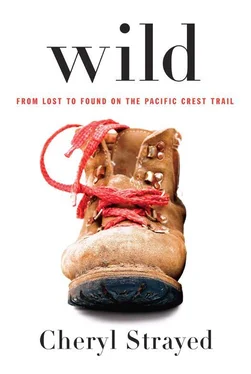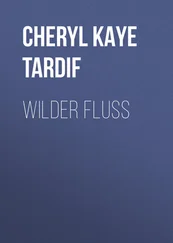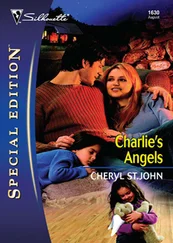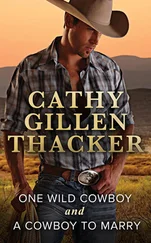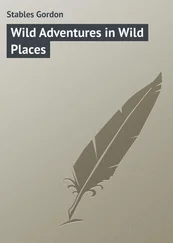Cheryl Strayed - Wild
Здесь есть возможность читать онлайн «Cheryl Strayed - Wild» весь текст электронной книги совершенно бесплатно (целиком полную версию без сокращений). В некоторых случаях можно слушать аудио, скачать через торрент в формате fb2 и присутствует краткое содержание. Год выпуска: 2012, ISBN: 2012, Жанр: Современная проза, на английском языке. Описание произведения, (предисловие) а так же отзывы посетителей доступны на портале библиотеки ЛибКат.
- Название:Wild
- Автор:
- Жанр:
- Год:2012
- ISBN:978-0-307-95765-8
- Рейтинг книги:4 / 5. Голосов: 1
-
Избранное:Добавить в избранное
- Отзывы:
-
Ваша оценка:
- 80
- 1
- 2
- 3
- 4
- 5
Wild: краткое содержание, описание и аннотация
Предлагаем к чтению аннотацию, описание, краткое содержание или предисловие (зависит от того, что написал сам автор книги «Wild»). Если вы не нашли необходимую информацию о книге — напишите в комментариях, мы постараемся отыскать её.
Wild — читать онлайн бесплатно полную книгу (весь текст) целиком
Ниже представлен текст книги, разбитый по страницам. Система сохранения места последней прочитанной страницы, позволяет с удобством читать онлайн бесплатно книгу «Wild», без необходимости каждый раз заново искать на чём Вы остановились. Поставьте закладку, и сможете в любой момент перейти на страницу, на которой закончили чтение.
Интервал:
Закладка:
“Visit you where?” he asked.
“Wherever I decide to live in the fall. After I’m done with the PCT.”
I thought about where I’d live. I couldn’t imagine where it would be. It could be anywhere. The only thing I knew was that it wouldn’t be here. Not in this state! Not in this state! my mother had disconcertedly insisted in the days before she died, when I’d pressed her to tell me where she’d like us to spread her ashes. I couldn’t ever get from her what she meant by that, if she was referring to the state of Minnesota or the state she was in — her weakened and confused condition.
“Maybe Oregon,” I said to Leif, and we were quiet for a while.
“The gazebo is cool in the dark,” he whispered a few minutes later, and we both looked around, seeing it in the shadowy night light. Paul and I had gotten married in it. We’d built it together for the occasion of our wedding nearly seven years before, along with help from Eddie and my mom. It was the humble castle of our naïve, ill-fated love. The roof was corrugated tin; the sides, unsanded wood that would give you splinters if you touched it. The floor was packed dirt and flat stones we’d hauled through the woods in a blue wheelbarrow my family had owned for ages. After I married Paul in the gazebo, it had become the place in our woods where people would walk to when they walked, congregate when they congregated. Eddie had hung a wide rope hammock across its length, a gift to my mother years before.
“Let’s get in this thing,” Leif said, gesturing to the hammock. We climbed in and I rocked us gently, pushing off with one foot from the very stone upon which I’d stood when I’d married Paul.
“I’m divorced now,” I said without emotion.
“I thought you were divorced before.”
“Well, now it’s official. We had to send our paperwork to the state so they could process it. I just got the final papers last week with a stamp from the judge.”
He nodded and said nothing. It seemed he had little pity for me and the divorce I’d brought on myself. He, Eddie, and Karen liked Paul. I couldn’t make them understand why I’d had to smash things up. But you seemed so happy was all they could say. And it was true: we had seemed that way. Just as I’d seemed to be doing okay after my mom died. Grief doesn’t have a face.
As Leif and I swung in the hammock, we caught glimpses of the house lights and the bonfire through the trees. We could hear the dim voices of the partiers as the party died down and disappeared. Our mother’s grave was close behind us, maybe only another thirty steps farther on the trail that continued past the gazebo and out into a small clearing, where we’d made a flowerbed, buried her ashes, and laid a tombstone. I felt her with us and I felt Leif feeling her with us too, though I didn’t say a word about it, for fear my words would make the feeling go away. I dozed off without knowing it and roused as the sun began to seep into the sky, turning to Leif with a start, having forgotten for an instant where I was.
“I fell asleep.” I said.
“I know,” he replied. “I’ve been awake the whole time. The ’shrooms.”
I sat up in the hammock and turned back to look at him. “I worry about you,” I said. “With drugs, you know.”
“You’re the one to talk.”
“That was different. It was just a phase and you know it,” I said, trying to keep my voice from sounding defensive. There were a lot of reasons I regretted having gotten involved with heroin, but losing credibility with my brother was the thing I regretted the most.
“Let’s take a walk,” he said.
“What time is it?” I asked.
“Who cares?”
I followed him back along the trail, past the silent tents and cars and down our driveway to the gravel road that passed our house. The light was soft and tinged with the slightest shade of pink, so beautiful that my exhaustion didn’t matter. Without discussing it, we walked to the abandoned house a short way down the road beyond our driveway, where we used to go as kids, bored on the long hot summer days before we were old enough to drive. The house had been empty and falling to the ground then. Now it was falling more.
“I think her name was Violet, the woman who lived here,” I said to my brother when we mounted the porch, remembering the lore about the house I’d heard from the Finnish old-timers years before. The front door had never been locked and it still wasn’t. We pushed it open and went inside, stepping over places where boards were missing from the floor. The same items that had been scattered around the house a dozen years ago were still there, amazingly, only now they were even more decrepit. I picked up a yellowed magazine and saw that it was published by the Communist Party of Minnesota and dated October 1920. A chipped teacup with pink roses on it sat on its side and I bent to right it. The house was so tiny it took only a few steps to have it all in view. I walked to the back and approached a wooden door that hung diagonally from one hinge, a pane of pristine glass in its top half.
“Don’t touch it,” whispered Leif. “Bad karma if it breaks.”
We walked carefully past it and into the kitchen. There were gouges and holes and a giant black stain where the stove used to be. In the corner stood a small wooden table that was missing a leg. “Would you carve your name into that?” I asked, gesturing to the table, my voice suddenly flashing with emotion.
“Don’t,” said Leif, grabbing my shoulders to give me a firm shake. “Just forget it, Cheryl. It’s reality. And reality is what we have to accept, like it or not.”
I nodded and he let go of me. We stood side by side, gazing out the windows to the yard. There was a dilapidated shed that used to be the sauna and a trough that was overrun by weeds and moss now. Beyond it, a wide swampy field gave way to a stand of birch trees in the distance, and beyond that a bog we knew was there but couldn’t see.
“Of course I wouldn’t carve into that table and neither would you,” Leif said after a while, turning to me. “You know why?” he asked.
I shook my head, though I knew the answer.
“Because we were raised by Mom.”
I hiked away from my camp in the clear-cut at first light and saw no one all morning. By noon I didn’t even see the PCT. I’d lost it amid the blow-downs and temporary roads that crisscrossed and eventually obliterated the trail. I wasn’t terribly alarmed at first, believing that the road I was following would snake its way back to another place where it intersected the trail, but it didn’t. I pulled out my map and compass and got my bearings. Or what I believed were my bearings — my orienteering skills were still rather unreliable. I followed another road, but it only led to another and another until I couldn’t clearly recall which one I’d been on before.
I stopped to eat lunch in the midafternoon heat, my monumental hunger slightly deadened by the queasy realization that I didn’t know where I was. I silently lambasted myself for having been so careless, for pushing on in my annoyance rather than pausing to consider a course, but there was nothing I could do now. I took off my Bob Marley T-shirt and draped it over a branch to dry, pulled another T-shirt from my pack and put it on. Ever since Paco had given me the Bob Marley shirt, I’d carried two, switching them out during the day the same way I did my socks, though I knew such a practice was a luxury that only added more weight to my pack.
I studied my map and walked on, down one rough logging road and then another, feeling a flutter of hope each time that I’d found my way back on track. But by early evening the road I was on ended in a bulldozed heap of dirt, roots, and branches as high as a house. I scaled it for a better view and spotted another road across an old clear-cut swath. I made my way across it until one of my sandals fell off, both the duct tape and the strap that held it across the top of my foot having detached from the rest of the shoe.
Читать дальшеИнтервал:
Закладка:
Похожие книги на «Wild»
Представляем Вашему вниманию похожие книги на «Wild» списком для выбора. Мы отобрали схожую по названию и смыслу литературу в надежде предоставить читателям больше вариантов отыскать новые, интересные, ещё непрочитанные произведения.
Обсуждение, отзывы о книге «Wild» и просто собственные мнения читателей. Оставьте ваши комментарии, напишите, что Вы думаете о произведении, его смысле или главных героях. Укажите что конкретно понравилось, а что нет, и почему Вы так считаете.
